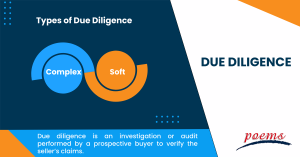Due Diligence
Table of Contents
What Is Due Diligence?
Due diligence is an investigation or audit performed by a prospective buyer to verify the seller’s claims. The main objective of the process is to confirm the accuracy and facts about a specific subject. It is one of the best ways to help a person analyse and mitigate the risk from an investment decision. This can be done by using available public information and other resources. You can use this strategy on any stock before investing your money in it.
Types of Due Diligence

Due diligence applies to a whole host of business aspects and is categorized differently. For mergers & acquisitions, due diligence helps people find and mitigate risks associated with the investment. Acquisition is when one company buys another company, and a merger means when two companies merge on equal terms. Further, the two main types of diligence that feature in the M&A world are complex and soft due diligence.
How to Perform Due Diligence for Stocks?
Individual investors often look for ways to perform due diligence for stocks. However, you can use due diligence in other areas like real estate, bonds, and other investment options. Your first step is to analyse the company’s capitalisation. For instance, mega and large companies have stable revenue streams, whereas small and mid-level companies experience stock fluctuations. So, analyse the company’s capitalisation and monitor profit, revenue, and margin trends to know how well the company is doing. Your next step is to look at the company’s competitors. Due diligence will help you compare the company’s profit margin with that of its competitors. Investors should then research stock price history (both short-term and long-term). Examining all these things will help investors get an idea about the company. Performing due diligence will help you to make an informed decision.
Due Diligence Basics for Startup Investments
Performing due diligence for a startup investment is not the same as doing it for companies with a track record. This is why you need to follow a few steps that mainly focus on startup investments. Plan a strategy that will help you recover your money if the startup’s business fails. Enter your partnership or figure out other ways that will help you to lose less in case of business failure. Always analyse the company to see if it has a robust business plan that appears to be realistic.
Special Considerations
Due diligence is an important aspect, especially in a business acquisition or a merger. The ultimate goal is to ensure that the buyer’s investment is safe and without any potential risks. There are two main types of due diligence – hard and soft due diligence. Although they seem the same yet they are quite different in certain aspects. Conducting quiet due diligence is complex as compared to hard due diligence. The main focus of soft due diligence is people, whereas complex due diligence focuses on numbers.
Performing Hard Due Diligence
While performing hard due diligence, investors should focus on earnings along with an in-depth analysis of the infrastructure of the company. Other aspects covered in hard due diligence include a review and audit of financial statements, analysis of the consumer market, assessment of ongoing and future litigation.
Performing Soft Due Diligence
To perform soft due diligence, businesses should go beyond numbers and costs. So you need to pay extra attention to the people or workforce of the company. Employees and the customer base of the company are the prime focus of soft due diligence. Also, quiet due diligence focuses on how customers respond or interact with the company. Resources like customer reviews and market data are also analysed.
Due Diligence Report
A due diligence report is a statement that involves researching and analysing material before an investment, partnership, acquisition. All the research and analysis acquired by the investigation are put into a report known as a due diligence report. The due diligence report is vital to understanding how a specific company plans to earn additional income. It is an important aspect that helps make a robust investment decision.
Frequently Asked Questions
The three main principles of due diligence are identification and assessment, prevention and mitigation, and accounting. These three principles hold great importance in determining and preparing due diligence reports.
No due diligence means investing or buying any specific investment without research or analysis. This means that the investment made is completed without researching the potential risks or expenses.
This type of research or analysis is conducted in any workplace to ensure the safety of employees. The ultimate goal behind workplace due diligence is to identify potential hazards and to take precautionary measures to avoid them. This type of due diligence is essential as it can improve employee safety and increase business efficiency.
To ensure due diligence, the buyer has to follow a few steps. The steps include analysing the capitalisation, resources acquisition, margin, competitor measurement, comparative study, valuation multiples, administration and share ownership, balance sheet, history of stock costing, stock suspension, expectations, and examination of long and short-term risks. Performing these steps will ensure that due diligence is thoroughly conducted, and you will get the right results.
One of the best examples of due diligence is buying a property after thorough inspection to avoid financial risks in the future. Another example of due diligence in researching and analysing the significant aspects of the targeted firm before a merger or acquisition.
Due diligence is usually performed when the buyer or investor agrees to make a financial deal, and they either wish to acquire a business, merge the company or make other investment decisions. It is conducted before signing the contract to ensure that there are no future complications.
Related Terms
- Margin Requirement
- Pledged Asset
- Stochastic Oscillator
- Prepayment risk
- Homemade leverage
- Prime bank investments
- ESG
- Capitulation
- Shareholder service fees
- Insurable Interest
- Minority Interest
- Passive Investing
- Market cycle
- Progressive tax
- Correlation
- Margin Requirement
- Pledged Asset
- Stochastic Oscillator
- Prepayment risk
- Homemade leverage
- Prime bank investments
- ESG
- Capitulation
- Shareholder service fees
- Insurable Interest
- Minority Interest
- Passive Investing
- Market cycle
- Progressive tax
- Correlation
- NFT
- Carbon credits
- Hyperinflation
- Hostile takeover
- Travel insurance
- Money market
- Dividend investing
- Digital Assets
- Coupon yield
- Counterparty
- Sharpe ratio
- Alpha and beta
- Investment advisory
- Wealth management
- Variable annuity
- Asset management
- Value of Land
- Investment Policy
- Investment Horizon
- Forward Contracts
- Equity Hedging
- Encumbrance
- Money Market Instruments
- Share Market
- Opening price
- Transfer of Shares
- Alternative investments
- Lumpsum
- Derivatives market
- Operating assets
- Hypothecation
- Accumulated dividend
- Assets under management
- Endowment
- Return on investment
- Investments
- Acceleration clause
- Heat maps
- Lock-in period
- Tranches
- Stock Keeping Unit
- Real Estate Investment Trusts
- Prospectus
- Turnover
- Tangible assets
- Preference Shares
- Open-ended investment company
- Standard deviation
- Independent financial adviser
- ESG investing
- Earnest Money
- Primary market
- Leveraged Loan
- Transferring assets
- Shares
- Fixed annuity
- Underlying asset
- Quick asset
- Portfolio
- Mutual fund
- Xenocurrency
- Bitcoin Mining
- Option contract
- Depreciation
- Inflation
- Cryptocurrency
- Options
- Asset
- Reinvestment option
- Capital appreciation
- Style Box
- Top-down Investing
- Trail commission
- Unit holder
- Yield curve
- Rebalancing
- Vesting
- Private equity
- Bull Market
- Absolute Return
- Leaseback
- Impact investing
- Venture Capital
- Buy limit
- Asset stripper
- Volatility
- Investment objective
- Annuity
- Sustainable investing
- Face-amount certificate
- Lipper ratings
- Investment stewardship
- Average accounting return
- Asset class
- Active management
- Breakpoint
- Expense ratio
- Bear market
- Annualised rate of return
- Hedging
- Equity options
- Dollar-Cost Averaging (DCA)
- Contrarian Investor
Most Popular Terms
Other Terms
- Settlement currency
- Federal funds rate
- Active Tranche
- Convertible Securities
- Synthetic ETF
- Physical ETF
- Initial Public Offering
- Buyback
- Secondary Sharing
- Bookrunner
- Notional amount
- Negative convexity
- Jumbo pools
- Inverse floater
- Forward Swap
- Underwriting risk
- Reinvestment risk
- Final Maturity Date
- Payment Date
- Secondary Market
- Mark-to-market
- Yield Pickup
- Subordinated Debt
- Trailing Stops
- Treasury Stock Method
- Bullet Bonds
- Basket Trade
- Contrarian Strategy
- Exchange Control
- Notional Value
- Relevant Cost
- Dow Theory
- Speculation
- Stub
- Trading Volume
- Going Long
- Pink sheet stocks
- Rand cost averaging
- Sustainable investment
- Stop-limit sell order
- Economic Bubble
- Ask Price
- Constant prepayment rate
- Covenants
- Stock symbol
- Companion tranche
- Synthetic replication
- Bourse
- Beneficiary
- Witching Hour
Know More about
Tools/Educational Resources
Markets Offered by POEMS
Read the Latest Market Journal

In the diverse and complex world of investing, unit trusts stand out as a popular...

Back in Business: The Return of IPOs & Top Traded Counters in March 2024
Start trading on POEMS! Open a free account here! At a glance: Major indices continue...

Weekly Updates 15/4/24 – 19/4/24
This weekly update is designed to help you stay informed and relate economic and company...

From $50 to $100: Unveiling the Impact of Inflation
In recent years, inflation has become a hot topic, evoking strong emotions as the cost...

Japan’s Economic Resurgence: Unveiling the Tailwinds Behind Nikkei 225’s Record Leap
Source: eSignal, Intercontinental Exchange, Inc. In the heart of Japan’s economic landscape, the Nikkei 225...

Weekly Updates 8/4/24 – 12/4/24
This weekly update is designed to help you stay informed and relate economic and...

What Makes Forex Trading Attractive?
In a world where the click of a button can send goods across oceans and...

Weekly Updates 1/4/24 – 5/4/24
This weekly update is designed to help you stay informed and relate economic and company...












